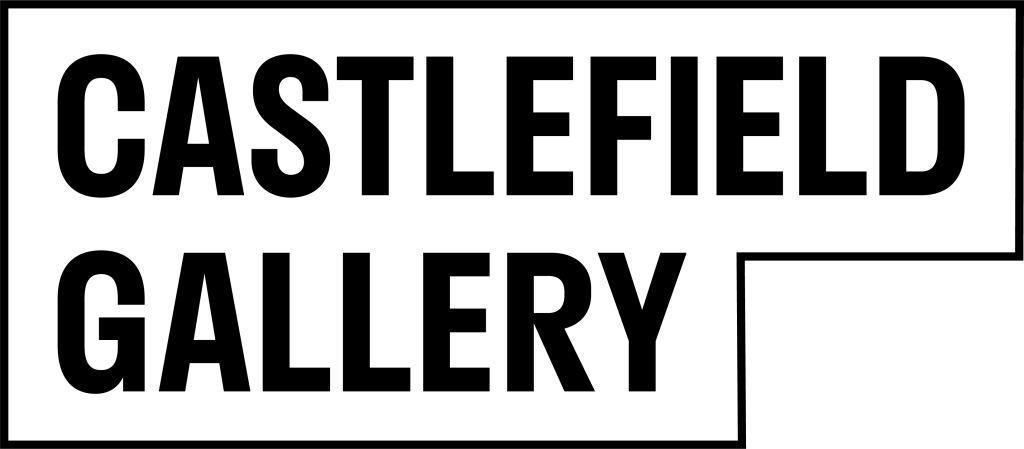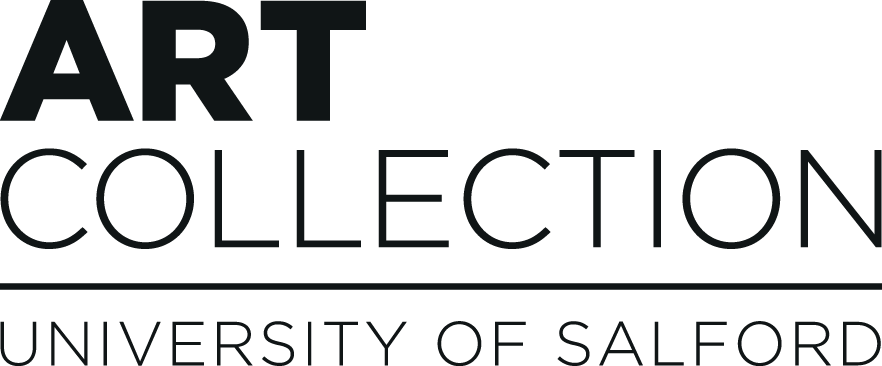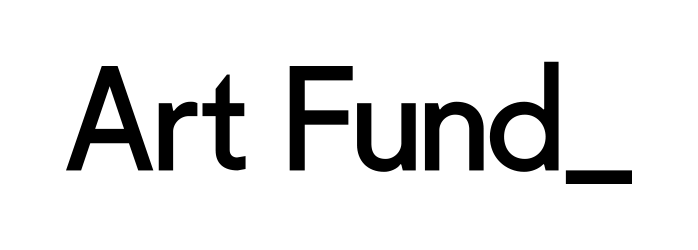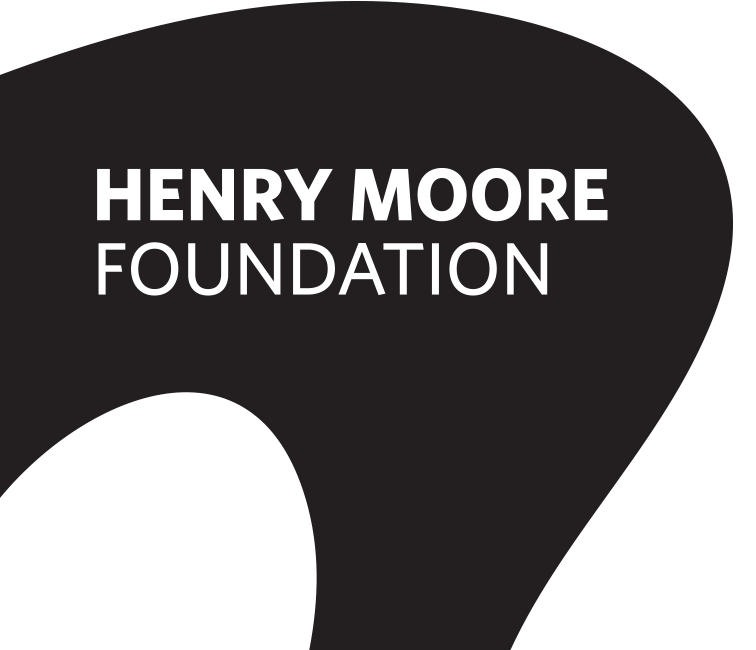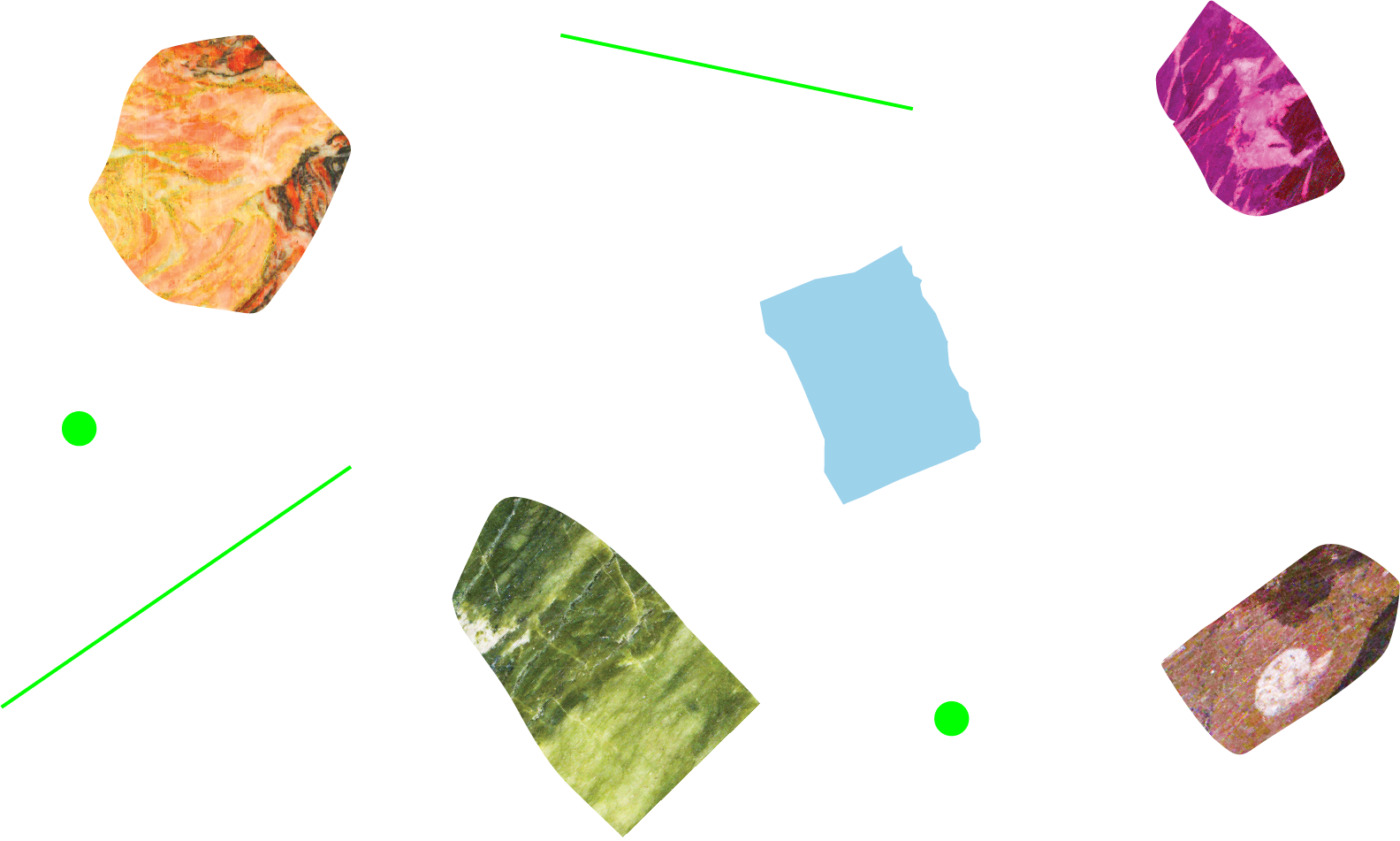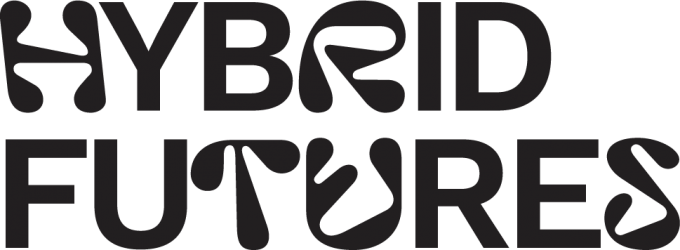
Collective Futures is born out of the desire to collaborate, identify and tackle the climate crisis issues which most concern the local communities close to our partnership.
Steered by a group who have been recruited for their perspective on the climate crisis, Collective Futures acknowledges that people can be experts in their communities and that the best plans involve the very people that are affected by them.
Identifying problems, exploring new ideas and possible solutions, Collective Futures will share and showcase examples of creative work that has made an impact in local and global communities. It will tease out the challenges faced by their local communities and arts organisations to explore what matters, what action to take and what motivation exists.
-
Collective Futures First Meeting – 26th June 2023
Collective Futures began with a warm welcome of foraged pine needle tea. Introductions focused on connection to place followed by role and finally our names which brought a spaciousness to the room – a personal sharing and insight.
Sam Pickett began with a talk. The Collective explored her exhibition through an informal comment and reflection session. Conversations about the gendered experience of being in natural spaces and feeling of fear transitioned to cultural fear of public spaces. Living with nature, side by side, such as the difference between pets and pests and the desirability of weeds and edibles were explored. Acts of foraging for natural dyes, accessibility of scientific data, community participation methodologies and what is deemed a ‘wild’ space were interrogated. This led the group to question whether the artist’s role should be to challenge resistance by working with people who contest ‘wild’ spaces’ and what managed and unmanaged nature is.
Debbie Yare gave an introduction to her work which focused on how the landscape supported her return to health and looked at low cost artistic practice in financial and environmental perspectives. Her talk centred on what it means to be alive in a place and be alive to a place. Debbie spoke about frustration for ‘ecosystems and service’ which relates to what humans can get out of nature, a term she felt was extractive.
Debbie Yare gave an introduction to her work which focused on how the landscape supported her return to health and looked at low cost artistic practice in financial and environmental perspectives. Her talk centred on what it means to be alive in a place and be alive to a place. Debbie spoke about frustration for ‘ecosystems and service’ which relates to what humans can get out of nature, a term she felt was extractive.
-
Collective Futures Second Meeting – 10th July 2023
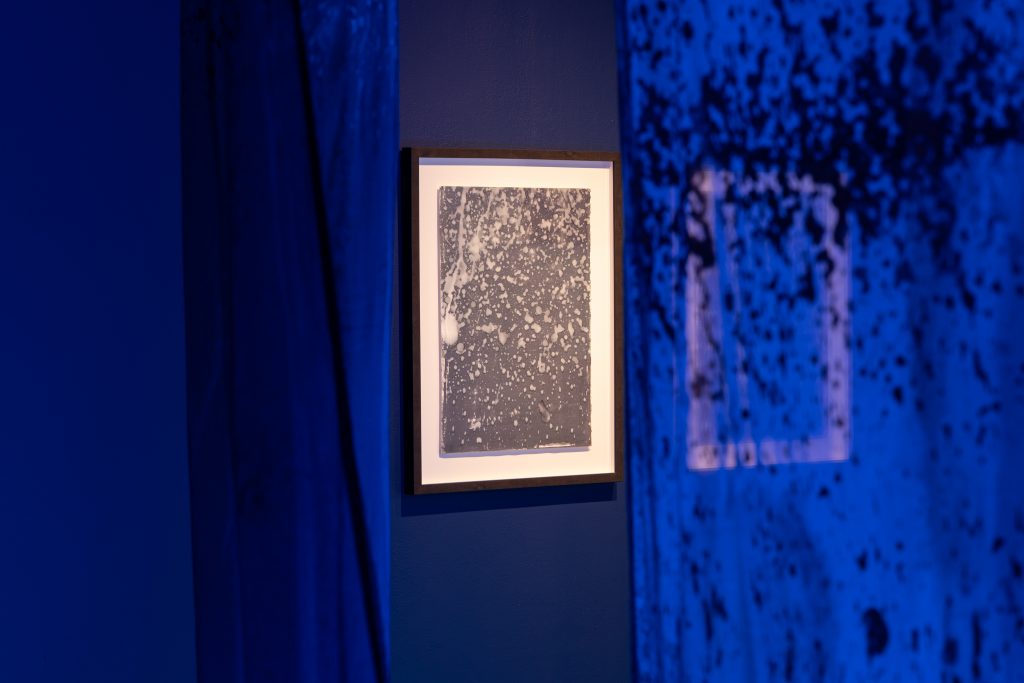
Installation View: Jessica El Mal, Spring Rain 09.12.2022. Photography by Jules Lister. The second introduction to Collective Futures incorporated a curator and artist-led tour of The Poetics of Water, an exhibition by Jessica El Mal and Parham Ghalamdar at Castlefield Gallery, Manchester. Curator Matthew Pendergast situated the exhibition in the context of Castlefield Gallery’s origins as an artist-led space with a purpose of supporting artists in the North West and as part of Hybrid Futures – a pilot project which explores how artwork is cared for, collected, commissioned, acquired and transported. Exhibiting artists, Parham Ghalamdar described the overlap between his practice and the climate collapse in terms of the existential concerns he has experienced as an asylum seeker and the fragility of democracy and life standards that could immediately change through the unfolding of political unrest or a threat to national/ individual security. Parham spoke about his new departure into ceramics – a material that can be both wet and dry at the same time, gloopy and solid or both dirty and beautiful. Parham hopes to reveal the ‘social, collective way to think outside the binaries’, to be conscious of our own carbon footprint and create space for conversation.
The Collective shared a meal together prepared by the Open Kitchen – a catering company who are committed to producing food in the most sustainable and ethical way. Dinner conversation included singing the praises of domestic spiders whose webs act as natural air filters and a call to do less cleaning, Louise Bourgeois’ spiders – stitching, weaving, mending, the emergence of mosquitos specific to the London Underground, red earthworm sausages found in the Philippines, climate-aware photography, presenting data connected artistically/creatively, utopian and dystopian futures and personal and collective responsibilities. Discussion was expansive covering the failing education system compared with the regenerative activism of children through cultivation of sphagnum moss set against play, art, culture as vehicles for learning.
-
Collective Futures Third Meeting – Resonant Objects
Resonant Objects and Regrouping
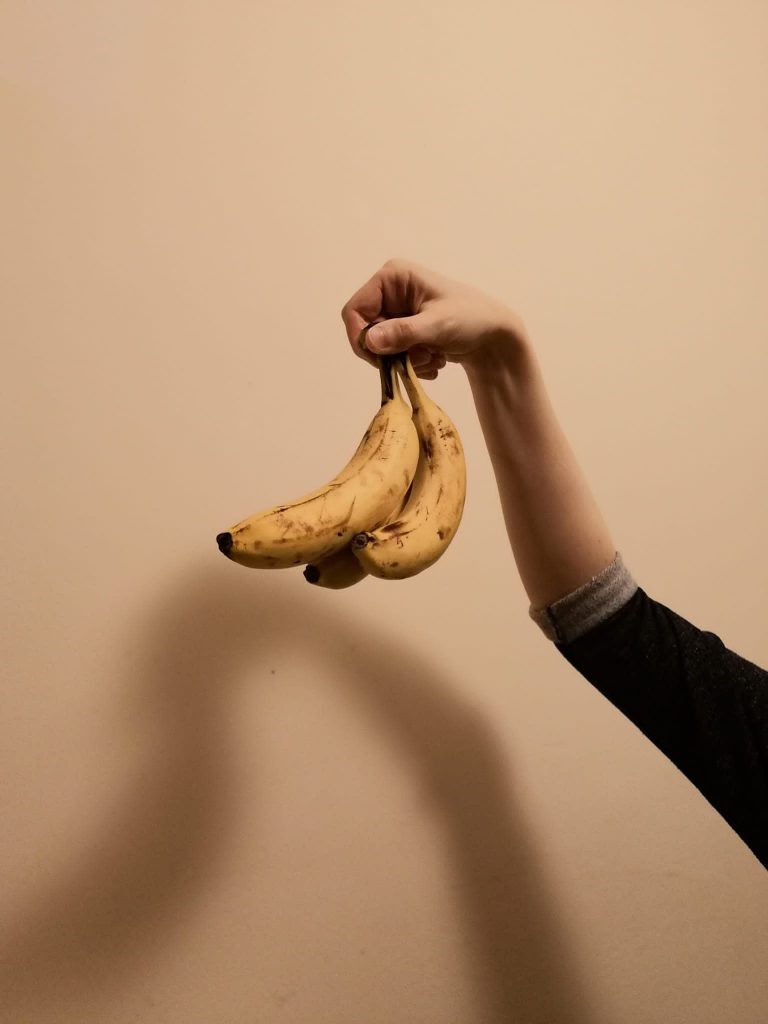
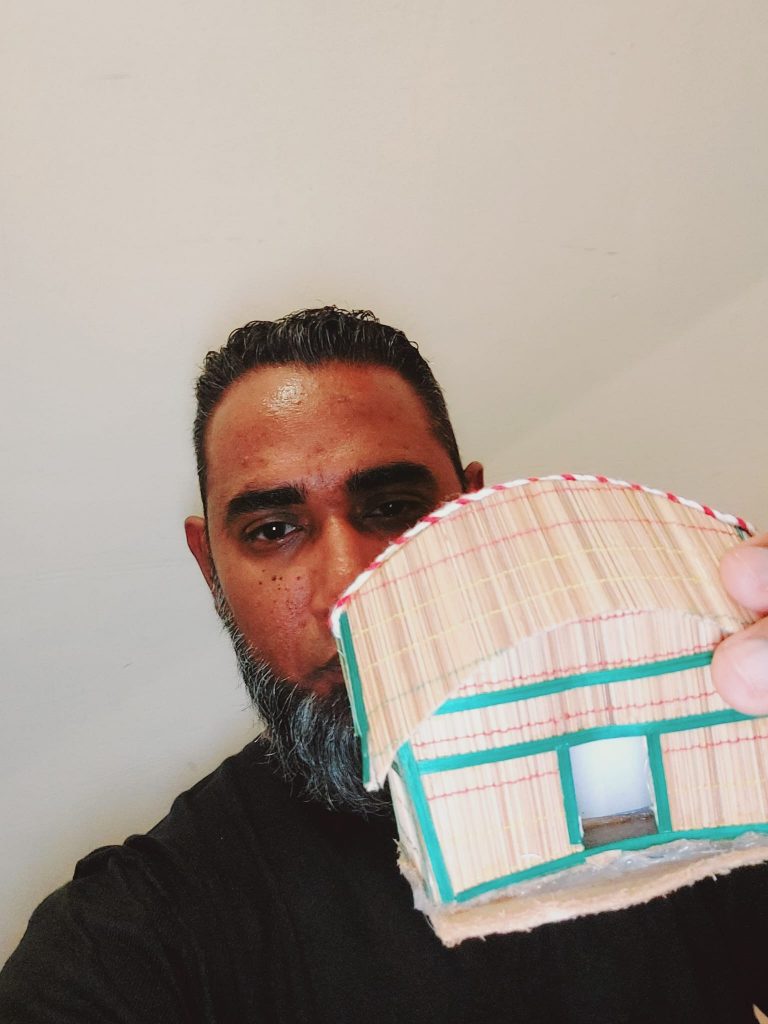
For our next meeting of the Collective Futures group, we met online on 5 October 2023. Each brought an object which holds a resonance in connection to the climate crisis and we shared why it is meaningful.
Objects included a cast iron frying pan, an overlocker, an ornament, a banana, books, metal straws, Twin Peak DVDs, a calculator, antiques, a family photograph, a wind- up radio, cleaning products, a spider plant, bin bags, African rocks, breath and Sajida’s nose.
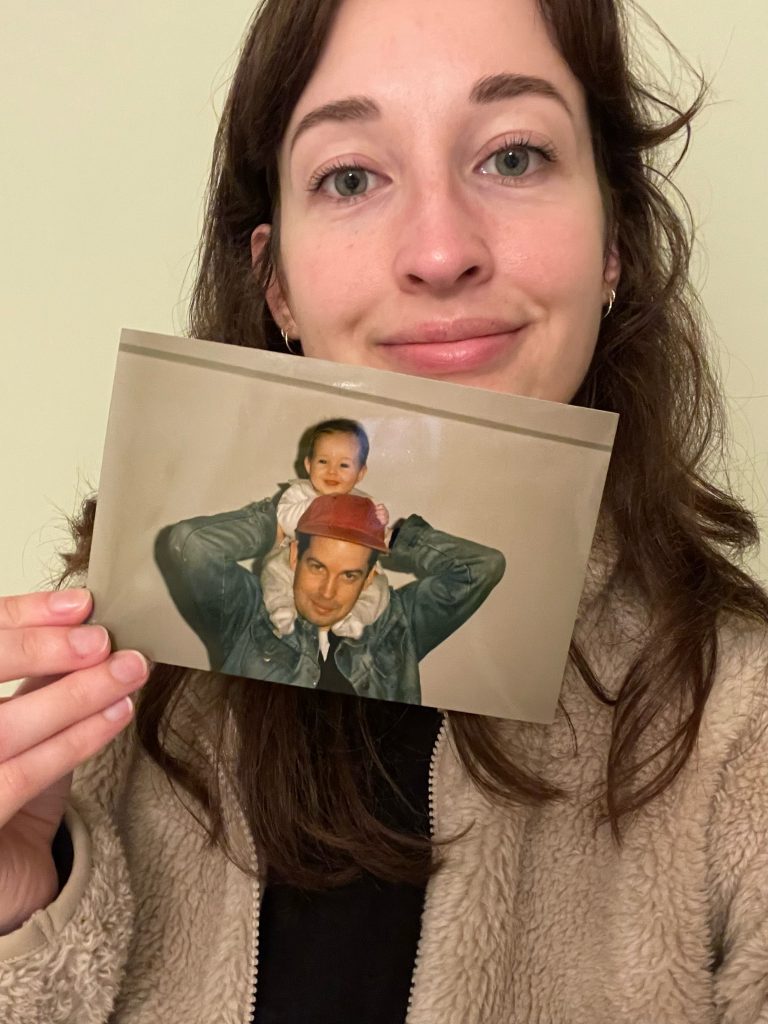
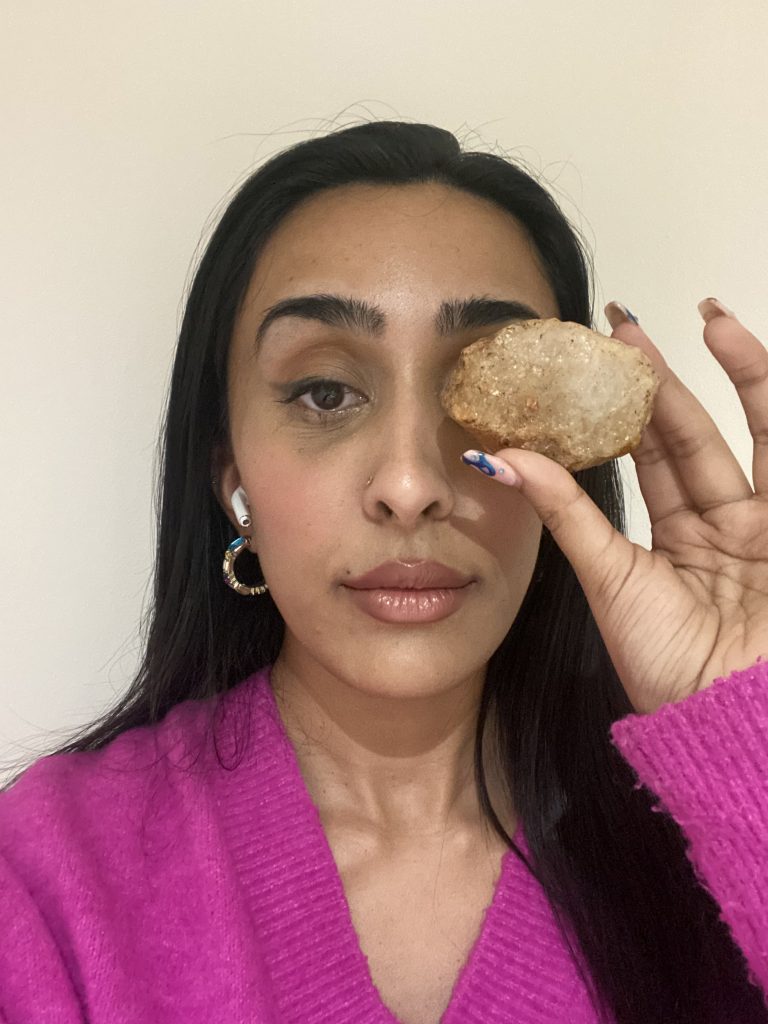
In under an hour, the Collective shared personal experiences, memories and emotions presenting objects that took us from the Amboseli, Kenya droughts and the mass deaths of animals, to sustainable bamboo building materials in Bangladesh to the worlds’ most contaminated – River Doe Lea (1995) – in Derbyshire to the everyday ritual of household waste disposal in Rochdale plus several other significant points of reference and resonances.
The feelings that were indirectly and directly expressed included the need for preservation of the past, fear, disbelief, overwhelm, frustration, injustice in the present, a sense of rootedness, the possibility for change, obligatory hope, the desire to nurture and cultivate and the acknowledgement of our inextricable connection to the world.
It’s not easy to get this kind of level of emotion and connection out of such a short session – especially one that takes place online. It was a really powerful sharing and there’s clearly so much more to unpack between us.
-
Collective Futures Fourth Meeting – POWER
Artist Hilary Powell and filmmaker Dan Edelstyn walked the Collective Futures group through their work and the motivation for POWER.
Dan and Hilary trade as Optimistic Foundation CIC, a creative and community-based organisation that focuses on shifting power and subverting power structures. Power as energy and power as financial system, taking on projects to wipe out decades of debt and galvanising communities to take direct action. Hilary and Dan use their sphere of influence to incrementally and strategically build a vision of a better future and develop strategies to resource this.
Watch their presentation here.
-
Collective Futures Session 5 – Regenerative Cultures
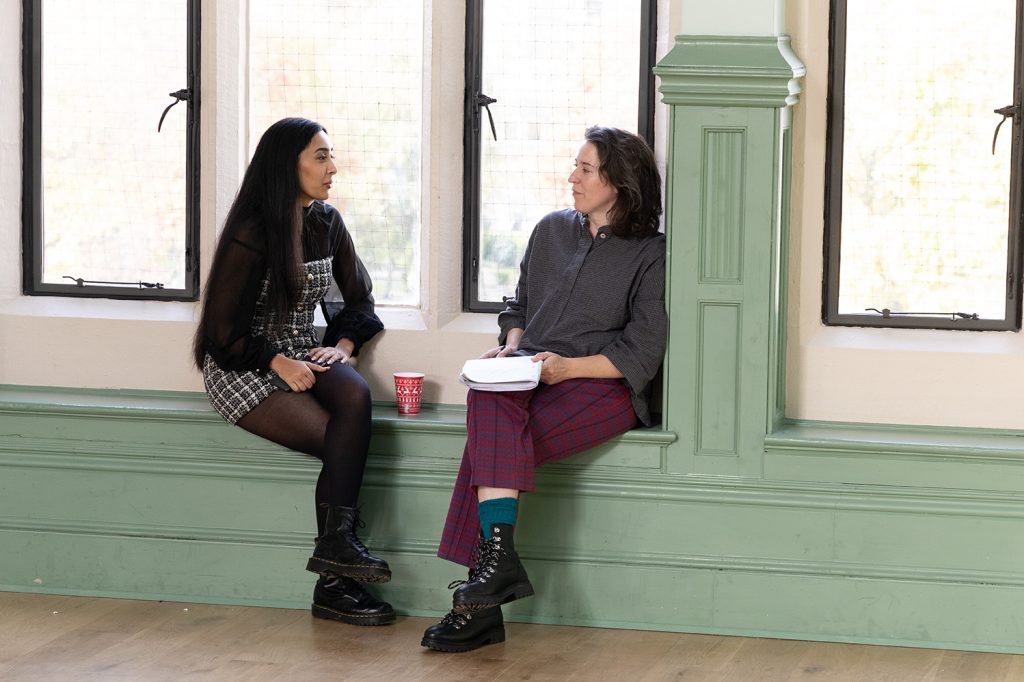
Collective Futures members Mehren and Caroline in conversation at Rochdale. (5-minute read)
Liz Postlethwaite of Small Things Creative Projects began the Collective Futures session by asking the group what they had each noticed in nature today. In response, the collective shared their observations on the changing colour of the autumn, heavy rain and the oxygenating effect of negative ions and bacteria release, the clouds and the light over the moors.
In small groups the collective went on to explore what regenerative means to them:- New iterations
- Momentum and energy
- Doesn’t take more than it provides
- Application to different models, organisations, system
- Connected, collaborative and co-creative
- Renewed, continued as opposed to ending of fragmented
From the sharing of a weekend activity – sweeping up autumn leaves – links were made between the body and the visceral process of regeneration, mutation and change including the menopause and searching for something in amongst the mulch. A comparison to the film Alien was drawn.
Liz expanded on these shared views, drawing attention to process, ecologies, sense of connectedness and self generation. She explained how the earth is regenerative and has been developing complex regenerative systems for 4.6 billion years and is a continuous growth or cycle of life giving process. The conversation touched on abundance, a definition of ‘we’ being bigger than the human experience and what ‘we’ need, what’s extracted is different for different people at different times.
Extractive, Sustainable, Resilient and Regenerative models.
Extractive was explained as the predominant, industrial culture which keeps taking until nothing is left in systems, exactly where we are now – with a system losing capacity over time. Sustainable provides a steady flow -a system that was not depleted but not rebuilt at the same time. Resilient – a term co-opted in contemporary culture referring to an ecosystems ability to recover from shock. Regenerative held an upwards trajectory ecosystem, building capacity, growing life to allow for a resilient system to flourish.
The collective broke off into groups to discuss how these models of practice related to our own practices. This led to a discussion of how using these words was triggering for one member of the collective who connected the concepts to mutation and regrowth in an embodied sense. This directly linked to one member of the collective working for the NHS and the extraction of care from people and the body’s ability to regenerate cells from within a health care system with a depletive and extractive culture.
Another group shared their experience of how the extraction of resources (green spaces and authoritative powers not listening to public consultation) is not ultimately beneficial to the economic models. This correlates to the pollution of the sea and subsequent depletion of tourism in Blackpool and the complex and intertwined economic / ecological systems we find ourselves navigating.
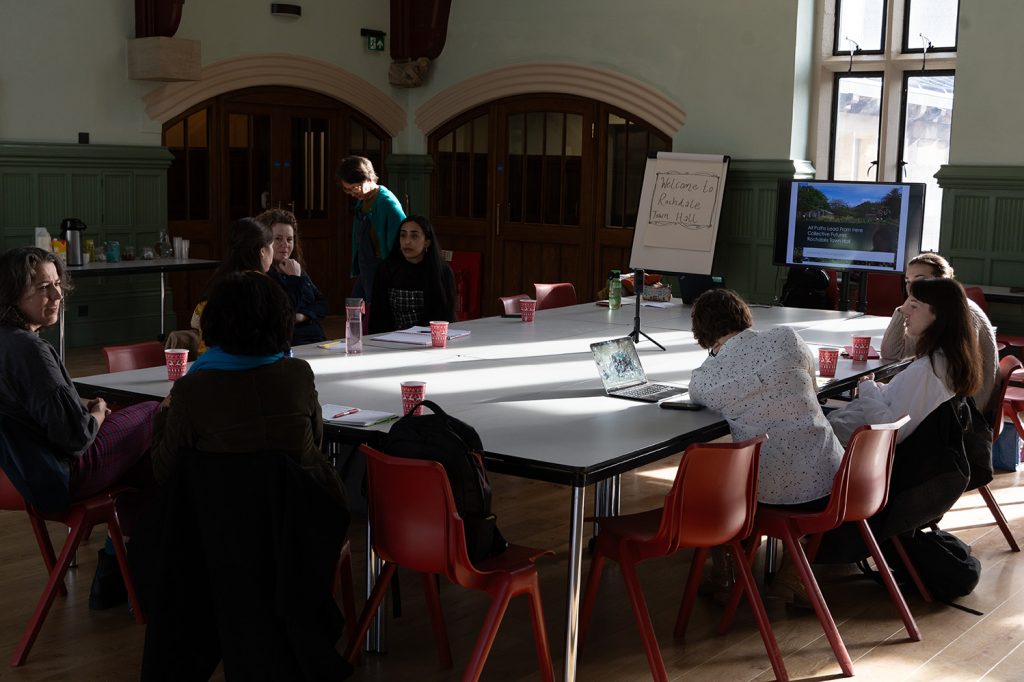
Members of Collective Futures in Rochdale. There was a light bulb moment for two members of the collective and articulation of Sustainable and Regenerative Practice and what they want to be aiming towards.
Liz talked about time and urgency and the need to slow everything down in terms of our own personal responsibility and our aspirations for change. The urgency and pressure we are under to fix the planet was spoken about as not particularly helpful and it was posited that perhaps we should be aiming to contribute to a future world we will never experience; An example given was a tree we plant today being the oldest tree in a forest we will never know. If our relation to time and timelines could be readjusted not to align ourselves with industrial models of production and consumption, we might understand our place in the ecosystem and cycle of decomposer/receptacle of biomass.
Liz began to describe the three principles of permaculture as an ethically based design system informed by indigenous cultures caring for the planet, people and a fair future. Liz spoke about the context of late capitalism and how capitalism is designed to make us feel unable to step away from it as we feel trapped in a producer/consumer mode rather than producer/consumer/decomposer model we find in natural ecosystems.
Liz spoke about the ‘impossible’ in relation to the fall of the Berlin Wall – how this once seemed unfeasible and towards imagining a future in which radical change and faith in uncertainty. One member of the Collective shared her insight on rights of species – such as sharks in the Maldives.
An activity of reflecting on our own practice as regenerative and some self-congratulation from within the group. One member noted the way in which budgets were set for artists rather than asking the artists to quote for their work as something that could change.
Liz showed the collective a wheel of privilege which visibly plotted that privilege is not a single entity and can have impact in multiple different ways.
-
Collective Futures Session 6 – Leave No Trace
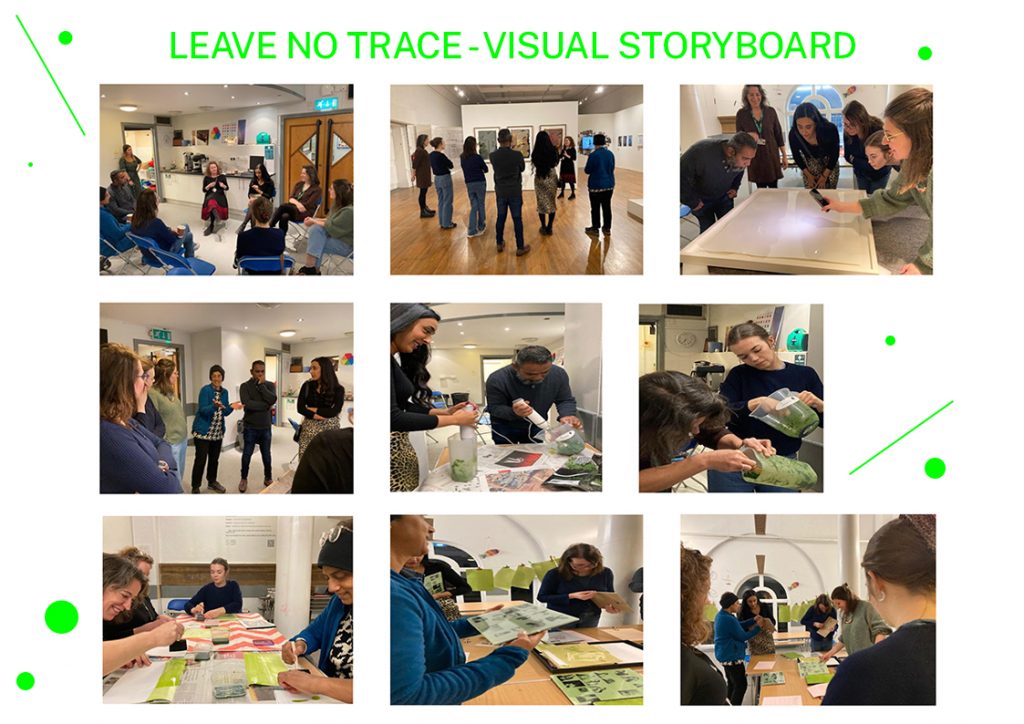
Artists are trained in mark making, printmaking, object making, film making and a multitude of ways to leave a legacy. Curators and archivists are trained in how and what to preserve of this process and cultural capital. How then can we reconcile this with ecological directives such as ‘leave no trace behind’ and ‘go zero waste’? What is sustainable making and how should we decide what is collected and valued? How can a collection or a creative practice be a vehicle for change?
To unpack these questions, photographer Gwen Riley Jones gave the collective the chance to explore sustainable photography including printing with wet spinach and take a deep dive into the University of Salford’s Art Collection to consider permanence, ephemerality and the cultural and environmental cost of creating and collecting contemporary art. The collective toured Salford Museum and Art Gallery, sharing their experiences of galleries before getting up close to interrogate three pieces of the collection and making links to place – Salford – and their sense of permanence of perspectives, bodies and materials.
Reflections were made on how the programme is iterative and how parts of earlier sessions are being internalised and embedded into the collective’s lives and workplaces beyond the reach of each session. The group left with an anthotype, to expose in sunlight, slowly at home and then note how the image fades and disappears over time. The image to expose is a montage of each member of the collective holding up their resonant objects from session three.
-
Collective Futures Session 7 – Crip Ecologies and New Contemporaries
(10min Audio)
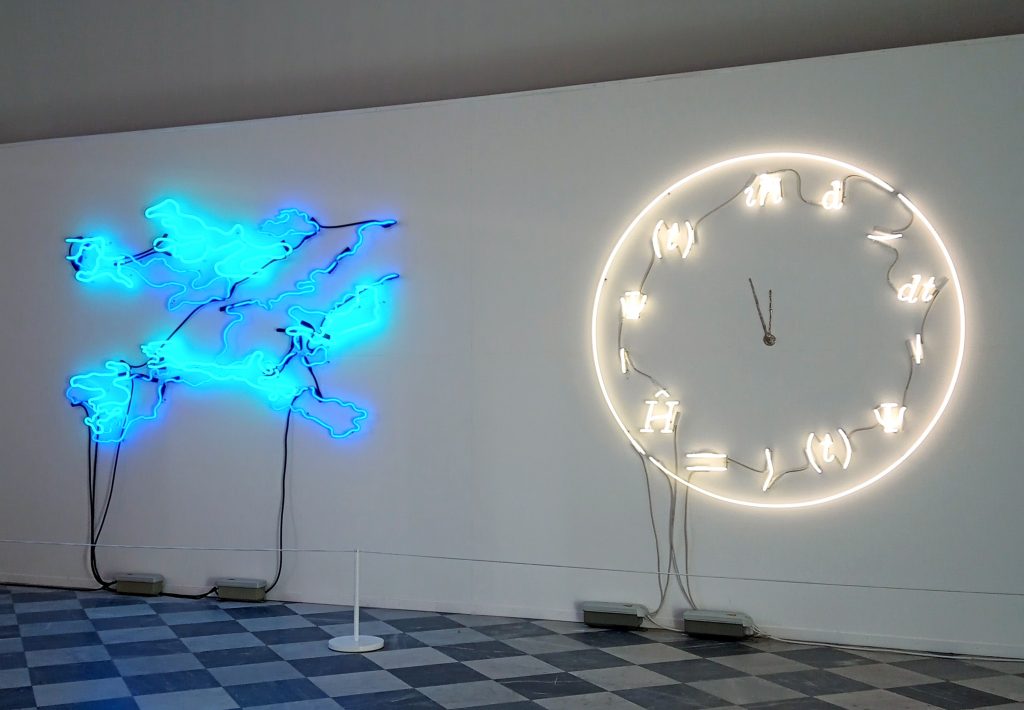
Installation View: GRUNDY X LIGHTPOOL X HYBRID FUTURES at Grundy Art Gallery, Blackpool. The collective met at the Grundy Art Gallery in Blackpool to view the new neon work commissioned for Hybrid Futures, RA Walden’s The Universe is a Clock (i) Schrödinger’s equation, (time dependent), 2023 and the New Contemporaries exhibition. The work of RA Walden explores Crip ecologies and non-normative readings of and relationships to time. New Contemporaries is an annual exhibition which presents the work of new graduate artists. As part of the gallery, tour the group discussed the ideas, innovations, relevance, effectiveness and voices these artists bring to the climate crisis debate.
In Blackpool library, the group took part in an exercise developed by Kit Abramson, Collective Futures’ Creative Producer and Rachel Burns, Curatorial and Community Engagement Coordinator, Touchstones with audio by RA Walden that asked the group to consider their own understandings of time. RA Walden’s work opens up questions of clock time, sick time and normative timekeeping as we occupy bodies in their varying states of health, on a planet careening toward sickness.
The collective did an exercise using metronomes – some Bakelite, some antique, large, or small, and colourful – which were laid out on a large table. The collective was each tasked to set their metronomes at the pace that they felt their body and their own embodied time was moving at that very moment. The intention was to connect as a collective, to attempt to see the ways that we are trying to share space with each other or to reach each other, when each experience time in vastly different ways. The metronomes in this exercise served as a tool to illuminate the ways that time is subjective. The collective was asked as they set their metronome to take some time to think about the ways that normative ideas of time affect their daily life. For example, how does the idea of time interact with the ideal of labour? How does our ability to imagine the future affect our ability to make change in the now, especially in relation to the climate crisis? How is time weaponised against marginalised bodies? How do our bodies fall short of the expectations of normative time? What ideas about time have I internalised that I don’t believe in? Do I feel like I have enough time? If yes, how much? If no, how little?
Once the group each found their speed and set their metronome, these were placed on the table and allowed to sit with the interrupting and interweaving beats. The group
collectively decided when everyone had had enough of listening to the cacophony of alternative times.
Discussion followed on each of our very different experience of time, reflecting back to our previous session in Salford – linking to the art collection and what we conserve, preserve, and reserve for future generations, long terms and long termism – looking for opportunity to change behaviour and make room for the ripple beyond our part in our institution or the role and influence we with have in our community.
Try the Exercise for yourself and listen to the Questions. You can download a free digital metronome too.
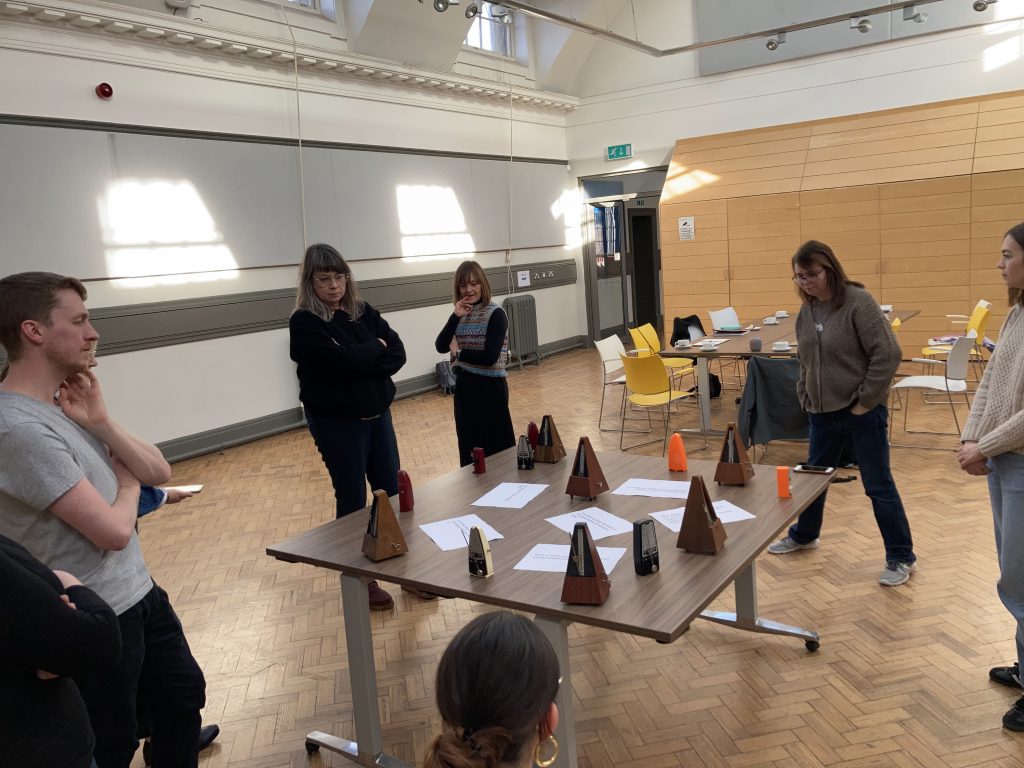
Collective Futures – Session 7 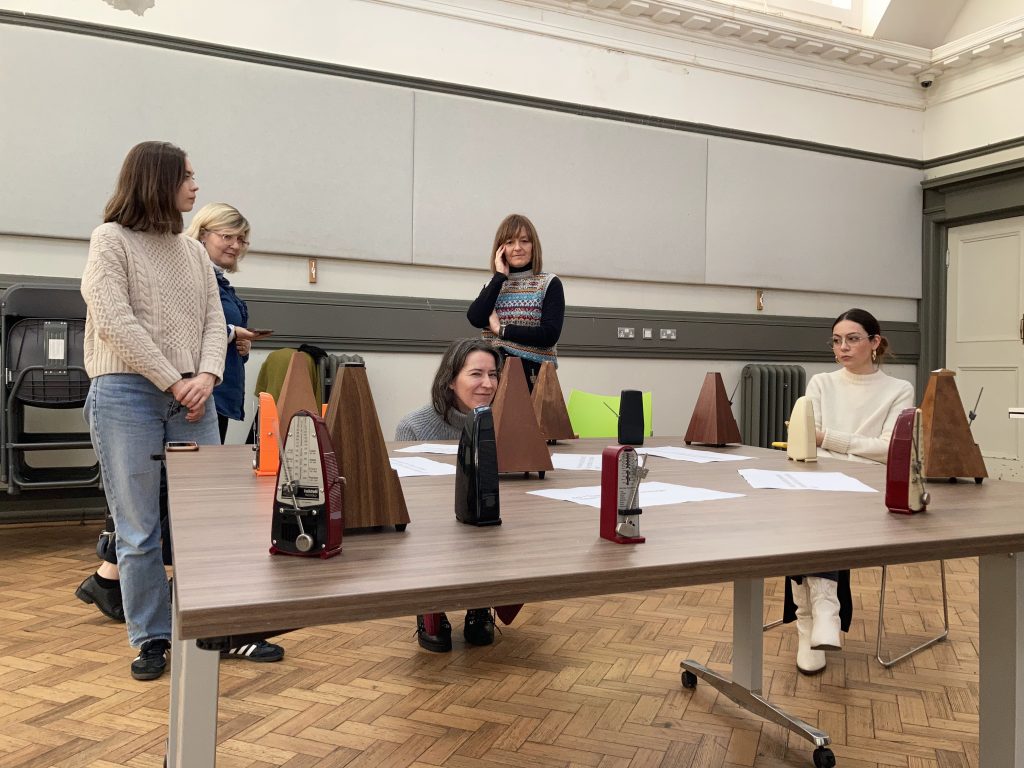
Collective Futures – Session 7
-
Collective Futures: Reflections: Sessions 8 & 9 Airing and Sharing – 12 & 20 February – online
In 2023, Collective Futures focused on hearing from invited guests. We received and considered the work of artists and community activists and began to share our personal interpretation of what we are experiencing. Reflection has been a part of our sense-making; combining facts, feelings, interpretations and deciding what all of that means.
From January 2024, the programme shifted from hearing from invited guests to hearing from each other. There were two online sessions in which the collective was invited to air and share emerging thoughts, ideas and actions they may have in response to the question: How might we best respond to the climate crisis? Responses were expected to be formative beginnings of something rather than polished, feasible scopes of work. The response to the structures ‘homework’ demonstrated how deeply some of the content had resonated with members at this formative point:
“For me, the value of Collective Futures lies in the opportunities it provides to hear from people who come from a variety of backgrounds, which are both very different and very similar to mine. It turns out we share the same struggles, but we also unlock new perspectives for each other. I think that’s the best or the only way to grow.”
“My favourite session so far was the one on Regenerative Cultures, especially the models: extractive, sustainable, resilient and regenerative. The word ‘sustainability’ has been everywhere around me – in the name of my team, my job title, our communications and strategies – literally everywhere, with the occasional reference to ‘resilience’ sprinkled in – for the last few years. Discovering the issue of sustainable vs regenerative is fascinating to me, if a little daunting, as it seems to be even more challenging to achieve than the good old sustainability. But then I remind myself that I don’t need to think about it as a corporate strategy, with lots of figures and deadlines. I can just do my best every day of my life and that’s good enough. That helps a lot. I found the idea, discussed at one of the sessions, of ‘contributing to a future world we will never experience’ to be surprisingly calming. I have faith, even though I struggle with uncertainty.”
“That session also reminded me of Debbie Yare’s words from the beginning of the project about the term ‘Ecosystem and services’ being extractive which again I found to be an interesting perspective which I’d never thought about, but which I agree with.”
“Collective Future has positively impacted my life in a very practical sense. I am fortunate to live in a residential area where most neighbours know each other, and we communicate regularly on a group chat. We discuss new ideas and initiatives, baby and cat sit for each other, and meet up for barbecues, film nights, and to celebrate birthdays or other occasions. I mentioned this project when we talked about work one day, and they sounded intrigued – a few of them are passionate about the environment. We watched the short film about POWER together and I also shared with them the story that Gemma shared at the Resonant Objects session, about the polluted river which caused lots of issues in her area (leaving out any personal details). This sparked another discussion, a wider one, about sustainability and ‘green’ initiatives, and prompted an old idea to resurface – to transform a small bit of a green space we’ve got between two of the buildings, into a community garden. Everyone offered to contribute, and it turned out we’ve already got all the resources we need in terms of tools, seeds, etc., from people’s balcony gardens (including a 2-ton bag of soil which our neighbour has somehow been storing on his balcony since last summer). We got permission from the facilities management (which I thought would be much trickier), and we’ll set the project in motion as soon as spring begins.”
“We’ve not even started yet, but even just the preparation has filled me with so much joy. It brought me back to myself in the sense that it touched and awakened my deep need to connect (with others but even more with the environment around me) and nurture, which led me to this place in my life – and ultimately Collective Futures – in the first place. Just like everything in nature, we have come full circle.”
The experience of Collective Futures to date had given the collective some new ways to think about their work and/or working practices. We sought to unlock these individual and shared responses more deeply in 2024 with sessions facilitated by Charlotte and Alia from Support Squad, sharing emergent projects and ideas we wanted to make and beginning to think about the role we might naturally lean into as a facilitator or driver of change.
-
Collective Futures: Reflections Session 10 Creative Lab – online
We used the session to understand first-hand from the collective what we needed from our final session on 16 March and to learn more about one participant’s application to an Arts Climate Acceleration Programme off the back of their Christmas homework.
Our session focused on the roles we can play to support or build projects or change. We used a metaphor of the scaffold to draw out and better understand the roles different people in the Collective naturally lean into – some people have ideas they want to run with, some want to support.
One of the group reassured a newer member of the collective who was feeling like he was ‘catching up’, with how she felt entering the space in June and that the space we have created is – safe and supportive – one that cultivates personal meaning leaving the professional worries of the day aside, helping to feel uplifted by the conversations.
One of the group shared an extract from the work of Céline Condorelli, from Support Structures by Céline Condorelli, Gavin Wade, and James Langdon:
“Everything starts from this intuition: that what I define as support structures can release potential, and that support is not to be reduced to a reactive, symptomatic, and redeeming gesture, but through its uttering we may be able to hear the unspoken, the unsatisfied, the late and the latent, the in-process, the pre-thought, the not-yet manifest, the undeveloped, the unrecognised, the delayed, the unanswered, the unavailable, the not-deliverable, the discarded, the over-looked, the neglected, the hidden, the forgotten, the un-named, the unpaid, the missing, the longing, the invisible, the unseen, the behind-the-scene, the disappeared, the concealed, the unwanted, the dormant.”
-
Collective Futures Reflections: Session 11 Planting Out – 16 March Windermere
As planned, we immersed ourselves in the landscape as we did at the very first Collective Futures session. Taking in the architecture, mountainous views and heritage of Windermere Jetty Museum on the lake shore, we also noted that the building has high eco credentials including being heated by the lake.
The session took place in three defined areas: a gravel circle, meadow to one side, lake to the other bordered by moss covered trees; mini amphitheatre where the boat house is situated; where the lake enters the building; and the learning room with floor to ceiling lake and fell aspects. The sun was just breaking through, the temperature was around 14 degrees.
Prior to our final meeting, Alia had shared a survey with the group to support the process of ending well. Beginning in the learning room, Alia shared the aggregated survey results and how this helped shape the day’s plan in response in which:
- 71% wanted free and open time to chat with others to get to know each other a little better
- 57% wanted focus time to think through and identify how we resource our ideas moving forward beyond Collective Futures
- 100% rest, relax and be with nature
- 86% end Collective Futures well together
Alia reminded the collective of the purpose of the day: to ‘end and/or transition well‘ and articulate what this could mean.
We started the sessions and set the tone of the day discussion with Sankofa (pronounced SAHN-koh-fah) – a word in the Twi language of Ghana meaning “to retrieve” (literally “go back and get”; san – to return; ko – to go; fa – to fetch, to seek and take). It also refers to the symbol of a bird with its head turned backwards while its feet face forward.
Sankofa is often associated with the proverb, “Se wo were fi na wosankofa a yenkyi,” which translates as “It is not wrong to go back for that which you have forgotten”.

Moving outside to the gravel circle, standing and facing each other, Alia guided the group to take a breath and to presence our minds and bodies using the weather and our internalised forecast as a barometer to understand and absorb where we find ourselves and what is available to us. We worked in pairs to discuss ‘hope’ and how long we could project this forward.
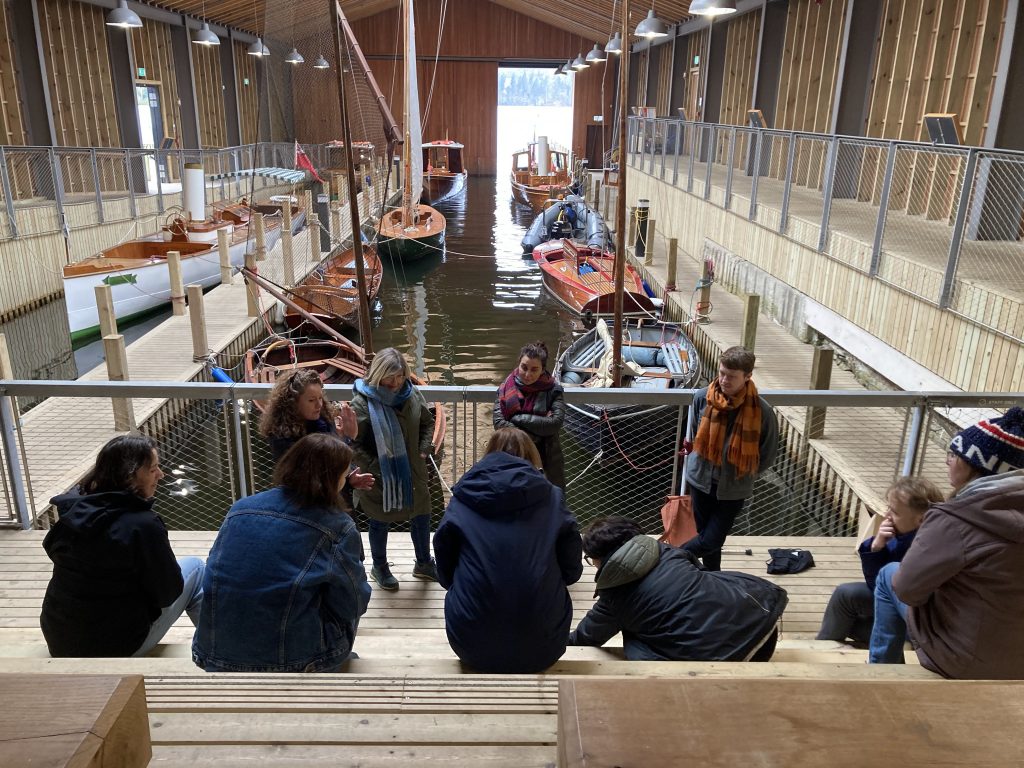
Collective Futures meeting in Windermere 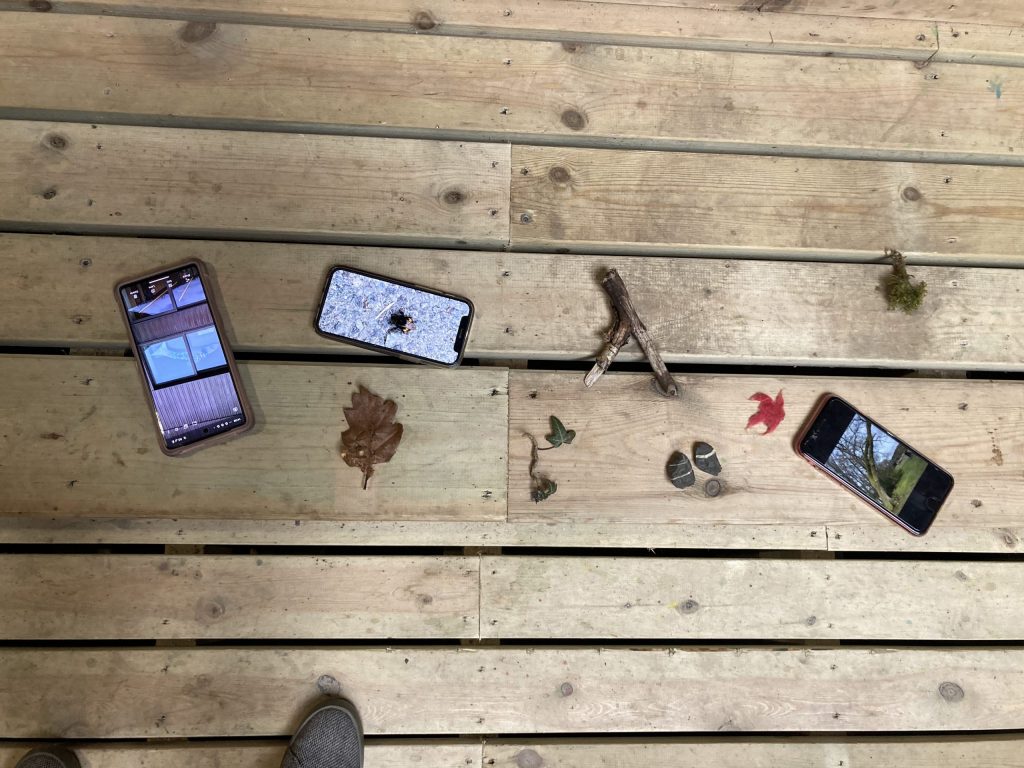
Objects representing the experience of Collective Futures. Breaking out to the lakeshore, Collective Futures’ Creative Producer Kit Abramson gave a summation of activity of the Collective Futures programme noting opportunity for iterations – woven into the process – and the impact the programme has had on individual thinking and behaviour in personal and professional spaces.
Returning to the circle, the group were positioned into an inner and outer circle and tasked to share what they had enjoyed most and what they had found most challenging in a 30 second burst. The outer circle then moved clockwise one space and the process was repeated with one caveat: we were not allowed to repeat anything we had already spoken about. This process was repeated five times.
The lunchtime task was to find an object that represented our experience of Collective Futures, to further explore the museum and grounds, and take the opportunity for chat and projection. Echoing our Resonant Objects session, we talked about the objects and images we had collected – an offering of moss, an oak leaf, a photograph of a bee, a photograph of a tree, a photograph of upcycled plant pot wellies, a fragment of pink acrylic fabric, a photograph of a fish, a forked smooth and flaky twig, two slates threaded with white sediment and two connected ivy leaves.
Moving on to the learning room, we each created a series of ‘I need’ statements on yellow post it notes, followed by the offering of support and resource that we could give to each other to support the development and realisation of activity/proposals/ongoing relationships. These were quickly and loosely grouped into categories of need aligned with committed offers of support and resources. The group discussed Collective Futures as a model and how to embed this model to create systems change if they could apply it to their own workplaces.
I need:
- To keep this relationship going
- Time to reflect like this
- Somewhere to share the importance of moss in nature
- Resource for my nature group drawing inspiration from art
- Support with a project to bring displaced people to be in and see the fells and capture connections between human experience of movement in green and urban space
- To know how to create this space for my colleagues
- To advocate for a sustainable photography degree
- To find a way to let things be open without controlling
- To measure things like digital storage of photos
- To keep the momentum going
- To find this space
- To articulate Collective Futures and the impact of it to our funders
- Help to share the value of the project with the wider team
There was agreement that the drop in, drop out structure suited those involved and that the role of the reflective notes/supporting media supported this approach. Going forward the collective committed to meet on a quarterly basis with a structure in place – we called these Provo-Catch Ups.
We moved on to writing with the hand we don’t normally write with – reflecting on the day – what we enjoyed, felt challenged by and what we were proud of. We finished the workshop with a gratitude circle and a poetry reading from Alia to close the day having supported the transition/extension of Collective Futures beyond this first phase funded programme.
-
Summary – Collective Futures
Summary – Collective Futures
How might we best respond to the climate crisis?
Collective Futures has focused on hearing from invited guests – artists, community activists and cultural strategists. Reflection has been a big part of the group’s sense-making, combining facts, feelings, interpretations and unlocking personal and professional relevance. The programme has given those involved new ways to think about their own work and working practices and begin to embed these individual and collective responses at carefully considered pace. The programme has led to direct action and infiltrated unexpected spaces, changing the way people think about their everyday activity for example – whether their actions go beyond sustainable to regenerative.
“…the take away for me: the difference between sustainable and regenerative practices was a real piece of learning for me.”
“I’d like to broaden and deepen my understanding of what it means to have a regenerative mindset.”
Direct Short Term Outputs
- creation of an urban garden,
- ambition and advocacy to create a community driven university course – sustainable photography, arts and climate acceleration programme,
- ambition to embed artists in school working with moss and dedicated nature group
- drive to examine operational practices – team reflection, digital footprints and application of the Collective Futures model,
- application of what is means to be regenerative,
- active, independent collaborative between the collective – engaging school pupils from Rochdale in Manchester
- the formation of strong, supportive bonds between the collective, across geographies and sectors – with a desire to continue to continue to provoke and share together.
‘The effect of these workshops will still be felt much later down the line.”
“Revelling in the ‘just do it’ mentality, unconstrained by KPI and organisation hierarchies -[these artists are] living their politics on a daily basis, anarchic and anti-capitalist – found it inspiring.”
